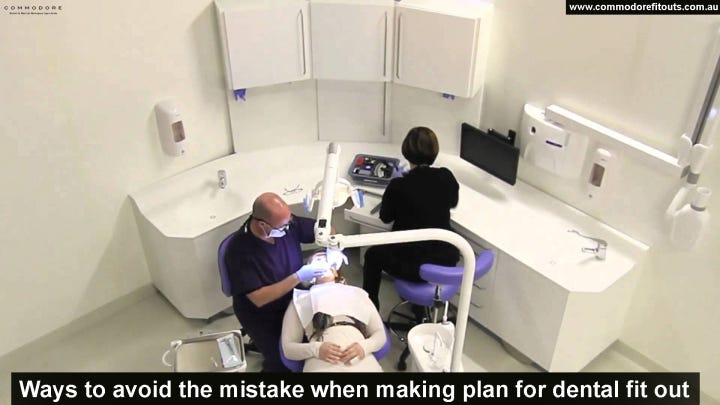Have you ever stopped to wonder how a surgery gets there in the first place? We walk into great medical workspaces all the time. Many with magnificent design features, expensive equipment and efficient layouts. But how does it all happen, and is it easy to produce a great surgery?
Project management is a crucial element of building your surgery. Designing and constructing a surgery requires coordination of three competing elements: scope, time and cost. Constraints and requirements of each element, affect the others. To be able to deliver a surgery of the required scope and quality, on time and at the budgeted cost is no mean feat. The project manager is required to consult with the dentist, the designer and tradespeople. The good project manager is almost an interpreter between the dentist who has a vision of how the practice will look eventually but often doesn’t know how to build it, the designer, who has created something magnificent but doesn’t have to work in it, and the team of tradesmen who are skilful but require clear instructions in builders language. Many tradespeople don’t like changes and are often busy and unsympathetic to the fact that the dentist is building a surgery for the first time. The experienced project manager has found his core team of tradespeople that are professional, experienced, considerate and clean.
Other parties and factors that require considerate management include councils, certifiers, centre management, equipment suppliers and installers, neighbours, the dreaded body corporate, security, parking issues, access issues, noise, dust, fire alarms… the list goes on and on. The good project manager is on site at 4am to supervise noisy concrete drilling for chair plumbing. All to maintain good relationships with the dentists new neighbours.
Imagine taking responsibility for the work of up to 20 different tradespeople and as many apprentices, along with supervising the installation of dental specific cabinetry and expensive equipment. The ‘cardiovascular’ system of a dental practice comprises hundreds of connections for power, plumbing, radiation devices, sterile areas, security systems and more. The good project manager has a hawk-like eye for detail. He visits the site daily and scours the area for any errors in skill, communication or judgement. There is a delicate balance in finding tradespeople that are price competitive and also have specific dental surgery experience. Location and time-line for installations and knowledge of the various equipment brands is crucial and only comes with experience and manufacturer training.
Many dentists get a shock when they visit their site halfway through construction. They see what looks, to the uninitiated, to be a bomb site. Hundreds of wires and pipes, wall partitions, ceilings, floors, windows all being worked on in a chaotic beehive. Upon closer inspection, however, there is order and discipline amongst the activity. Everything following a particular sequence, in a time-efficient, cost-effective manner under the watchful eye of the project manager.
The bottom line for any project manager is customer satisfaction. In the end, the project manager has but one master, and focusing on this fact often provides a compass to steer by in the busy on-site world. A good project manager will go into bat for their customer in order to get a good result. Sometimes it’s a late change to the plan, sometimes it’s an extra push over the weekend to make up for an unavoidable delay. Sometimes it’s just old fashioned patience. Almost all clients start to see and think of new ideas as the project rises in front of them. As much as we would like every selection and decision to me made before the first hammer is raised, it’s just unrealistic, and good project managers know it. The good project manager uses their experience and established systems to assist in decision making as early as possible but still have a flexible cooperative attitude along the way.
The next time you walk into a dental practice, have a good look around and imagine the work that went into creating it. Imagine what was there before the project manager arrived. Was it a derelict hardware store? Was it a chicken shop? The good project manager produces beautiful ergonomic spaces on time and on budget from any beginnings. If he’s good at it he will have pushed, strained, coerced and back-flipped to make it all happen, but he won’t show it.
For more information about medical fit outs, dental fitouts, medical interior design, dental design, please visit the
Commodore Fitouts.
Reference taken from
here.























 A professional dental fitouts sydney service provider always design your clinic in a way, that helps to generate more and more business. Another important advantage is, if you have a well decorated, professional looking clinic, then in future, if you want to sell it, you will get the best sale price. If you hire a professional designing house that help to construct your clinic properly, they will offer proper clinic plan or floor plan, council applications, medical interior design, Construction Tendering Services, Relocation Management & Sundries Procurement, etc.
A professional dental fitouts sydney service provider always design your clinic in a way, that helps to generate more and more business. Another important advantage is, if you have a well decorated, professional looking clinic, then in future, if you want to sell it, you will get the best sale price. If you hire a professional designing house that help to construct your clinic properly, they will offer proper clinic plan or floor plan, council applications, medical interior design, Construction Tendering Services, Relocation Management & Sundries Procurement, etc.